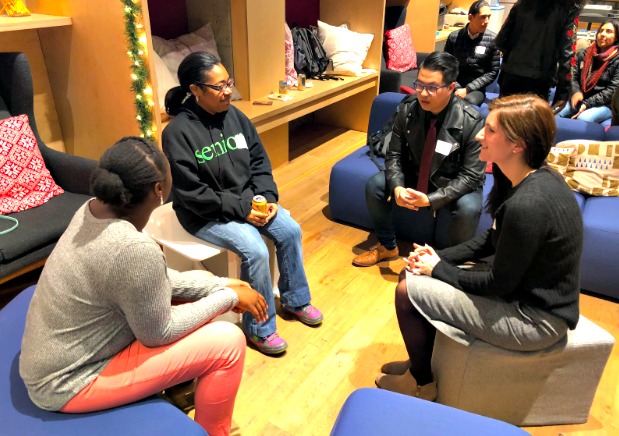At KIPP (Knowledge is Power Program), our goal is to support students on their journey to and through college. My position with KIPP as an Alumni Advisor is to support KIPP alumni who are in college navigate resources, provide academic and socio-emotional support, and help students understand their financial options. As a former KIPP student, I know firsthand some of the experiences of the college students I advise. My students come from a variety of cultural, social, and financial backgrounds, but the one thing that we all have in common is having attended a KIPP school.
I am able to connect with my students about our experiences and have an idea of where they’re coming from. What I’ve learned from many of them is that as they get older, KIPP’s advising services are not as relevant as they were when they were freshmen or sophomores. I realized that I was providing a sort of mentoring experience that they valued and wanted to explore more formally. Unknowingly, I was practicing what is known as near-peer mentoring; my students appreciate that I am close in age to them and have recently made a lot of the same decisions that they are faced with today. It clicked that formal mentorship could be a valuable service for KIPP to provide to our older alumni.
Throughout college, I always had an interest in working in education but not in the traditional sense. I was excited to learn more about this idea of near-peer mentoring since it seemed like something students were responsive to and wanted more of. What I didn’t realize is that there is a whole body of research around how near-peer mentoring can positively support college students and early career professionals. It has been proven that students who are mentored by a peer close in age develop stronger and more long-lasting relationships than they do with older adult mentors (DO-IT). Although not technically peers, the closeness in age allows for my students to feel comfortable opening up to me about what is going on in their lives and even ask about my own college career. Talking with them about their classes and financial concerns, we often connect through our personal college experiences. For instance, I talk to my students about how they feel about their roommates or being away from home or being the only person who looks like them in class. Their experiences navigating their college careers and everyday life rings visceral for me because these are the same things that I struggled with and still deal with daily.
As KIPP advisors, we have a pretty good understanding of what issues our underclassmen face and how to coach them through those dilemmas, but we weren’t tailoring our advising practices for upperclassmen. Last year, I wanted to focus on ways to better engage with our older and graduated students since their needs are much different than their younger peers. We wanted to adjust our support to be equitable and help students of all ages.
So, I launched a project to examine how KIPP could improve its advising practices and effectively engage our older alumni. As a KIPP alumna, this project was two-fold–being able to share how KIPP Through College could strengthen our advising practices, but also be more of a near-peer mentor for the alums who are my age. I wanted to hear directly from alumni about how we could tailor our efforts to support them while they’re nearing the end of college careers and beginning their careers in “the real world.” I spent time hosting focus groups with students and learned that we all valued the importance of mentorship. There was a shared desire for alumni to connect with other young professionals who share similar paths and who could speak to their success finding and securing jobs.
We heard our alumni and decided to launch a program that would support them in navigating adulthood and life after college. Through our newly launched near-peer KIPP Alumni Mentorship Program, we’ve been able to re-engage with alumni that have been out of touch with KIPP and provide tailored support for our upperclassmen preparing to graduate.
For the KIPP Alumni Mentorship Program, KIPP Alumni (mentees) are matched with young professionals (mentors) with whom they regularly meet throughout the year. The goal is for our alumni to lean on their mentors for advice and best practices, as well as beginning to grow a professional network.
Though we hope all alumni secure jobs in their field of interest upon graduation, every mentor/mentee pair has three metrics for success during the formal mentorship program:
- To finalize a resume
- To conduct informational interviews in their career field of interest, and
- To create a career development plan
We are excited to retain relationships with our alumni through near-peer mentorship, promoting involvement in the community, professional network expansion, and reflection for mentors and advisors to think of ways we can better serve our students with any pathway they choose to follow. Near-peer mentoring encourages a sense of belonging for our students and an increase in their engagement with KIPP as they develop as people and professionals. No one has all the answers to making sure that students persist through college, but in my experience of being an advisor for three years, I believe that all students deserve to have access to support and reassurance in who they are and in their journeys. Mentorship can be challenging, but it’s extremely rewarding to provide something new to our students.

